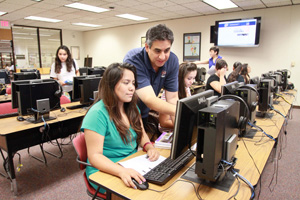By Daniel Perez
UTEP News Service
A small team made up mostly of UTEP librarians is part of an international collaboration of educators that launched an effort this fall to assess the impact and value of academic librarians and library services on student success.
UTEP was one of 75 institutions of higher education selected in the spring by the Association of College and Research Libraries to participate in “Assessment in Action: Academic Libraries and Student Success.” The 14-month project is funded by a $249,330 National Leadership Demonstration Grant from the Institute of Museum and Library Services.
The grant will help university librarians document the value of their academic libraries in relation to student success, build and strengthen leadership skills and collaborations among mutual stakeholders, and contribute to the creation of approaches, strategies and practices that academic libraries can use to promote the goals and missions of their institutions.
But that’s easier said than done, joked UTEP team leader Harvey Castellano, assistant director for instruction and information literacy services. His six-member group created a research metric for a summer pilot program and, after some tweaking, launched its study Aug. 26 in eight courses that are part of the Entering Student program.
“To create a working library assessment standard would be like finding the Holy Grail. No one’s figured it out,” Castellano said. “Our ultimate goal is to show how college and university libraries have measurable value. Are we effective? We want people to know they’re getting their money’s worth.”
The team – Castellano; Jo Anne Kropp, associatedirector of the Entering Student Program; Trinidad “Trini” Morales, research associate in the Office of Undergraduate Studies; instruction librarians Angela Lucero and Elizabeth Torres; and STEM (science, technology, engineering and mathematics) librarian Leslie Arms – developed an assessment that involved classroom surveys and online quizzes that will be administered to about 200 students during the semester.
The process involves demographic data and understanding the student search skills that need to be built and reinforced so they will consider using scholarly journals, databases and more than a million volumes on the library’s shelves, and not simply rely on Google and similar search engines.
“We know anecdotally that people benefit (from expanded research options), but how do we transfer that to statistics and prove it?” Castellano said. “I didn’t say it would be easy.”
For the pilot program, Morales and other members of the team took a small amount of time from a 3311 Methods of Research summer class to promote different research technology to 39 upperclassmen who mostly majored in psychology, sociology and criminal justice. The library instructors used verbal and video presentations.
“We’re all excited because we understand the value of what we’re doing,” Morales said. “We’ll get the data and do an assessment to find correlations with retention, grade point average and how long it (the interest in using more academic research options) lasts.”
Among the students in the pilot program was Robert Villegas, a senior multidisciplinary studies major. He called the instruction of key themes such as Internet navigation effective and valuable. It gave him the confidence to try more scholarly research options.
“The information could have been intimidating, but the librarians were helpful,” Villegas said. “They eased the tension. It would have been helpful to have received this information as a freshman.”
The UTEP team is sharing its results with five other campuses within the Mountain time zone and vice versa, and eventually will share with the other participating institutions that range from major universities to small community colleges from the United States and Canada.
The grant also will support the design, implementation and evaluation of a program to strengthen the competencies of librarians in leadership positions.
Results from this research will impact changes in the responsibilities of academic librarians, changes in the types of materials in academic libraries, and how students and faculty interact with library staff and materials, said Robert L. Stakes, associate vice president for Information Resources and Planning.
“Through the Assessment in Action project we will identify specific intervention strategies that will help us develop more effective resources for students, and make more effective decisions about supporting students,” Stakes said. “We all know the library is a critical element in helping students succeed in their academic endeavors, but with this project we will be able to identify those aspects that are most important.”
The library leader lauded Castellano and the others for their participation and added that UTEP’s inclusion recognizes the University’s commitment to innovation and student success.
